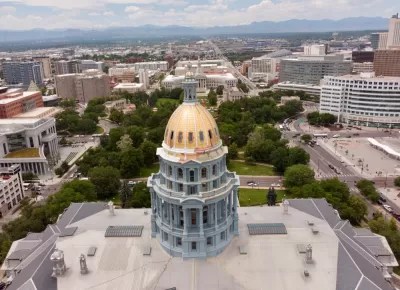Colorado’s “More Homes Now” bill has been drastically reduced in scope and ambition, showing the contemporary zoning reform movement still has obstacles to overcome.

It took about a month for a proposed law in Colorado to evolve from a mandate for upzoning—in the style of Oregon, California, and, most recently, Montana—to the creation of a state board to assist local governments with long-term planning and affordable housing development.
Planetizen reported in March about Senate Bill 213, proposed in the Colorado State Legislature and advancing with support of Governor Jared Polis. The so-called “More Homes Now” bill would have implemented state preemption of local control over zoning, forcing local governments to ease zoning codes to allow more dense residential development than currently allowed by single-family zoning.
The proposal encountered widespread, vocal political opposition from local leaders, however, and the bill’s scope has since been greatly reduced. According to an article by Jesse Paul and Elliott Wenzler, “Instead of forcing Colorado’s largest cities to allow duplexes, triples and fourplexes on at least 30% of their land currently zoned for single-family housing, a 39-page amendment to the measure would form a state board tasked with helping communities assess affordable housing needs and develop long-term plans.”
“The changes represent a major defeat for Polis, who during his State of the State address in January touted the land-use measure as the centerpiece of his affordable housing plans this year,” add Paul and Wenzler.
Local political leaders representing the state’s mountain and rural communities were quick to applaud the changes, according to a separate article by Robert Tann. Colorado’s mountain towns offer prominent examples of the effects new residents flowing into rural areas since the outset of the pandemic, raising housing costs and making it harder for service workers to live in towns dependent on tourism and recreation.
More articles on the retreat of SB 213’s ambitions can be read in articles published earlier in April by Andrew Kenney and Nathaniel Minor, a paywalled article by Seth Klamann, and an article by Marianne Goodland, which originally broke the news of the expected changes to SB 213.
According to Goodland’s summary of the article, the changes to the bill effectively “puts Department of Local Affairs back into its role as a resource and partner to local governments, instead of making it a regulatory agency.”
FULL STORY: Major land-use bill from Colorado governor, Democrats is gutted to remove all upzoning requirements

Planetizen Federal Action Tracker
A weekly monitor of how Trump’s orders and actions are impacting planners and planning in America.

Congressman Proposes Bill to Rename DC Metro “Trump Train”
The Make Autorail Great Again Act would withhold federal funding to the system until the Washington Metropolitan Area Transit Authority (WMATA), rebrands as the Washington Metropolitan Authority for Greater Access (WMAGA).

DARTSpace Platform Streamlines Dallas TOD Application Process
The Dallas transit agency hopes a shorter permitting timeline will boost transit-oriented development around rail stations.

Renters Now Outnumber Homeowners in Over 200 US Suburbs
High housing costs in city centers and the new-found flexibility offered by remote work are pushing more renters to suburban areas.

The Tiny, Adorable $7,000 Car Turning Japan Onto EVs
The single seat Mibot charges from a regular plug as quickly as an iPad, and is about half the price of an average EV.

Supreme Court Ruling in Pipeline Case Guts Federal Environmental Law
The decision limits the scope of a federal law that mandates extensive environmental impact reviews of energy, infrastructure, and transportation projects.
Urban Design for Planners 1: Software Tools
This six-course series explores essential urban design concepts using open source software and equips planners with the tools they need to participate fully in the urban design process.
Planning for Universal Design
Learn the tools for implementing Universal Design in planning regulations.
Municipality of Princeton
Roanoke Valley-Alleghany Regional Commission
City of Mt Shasta
City of Camden Redevelopment Agency
City of Astoria
Transportation Research & Education Center (TREC) at Portland State University
US High Speed Rail Association
City of Camden Redevelopment Agency
Municipality of Princeton (NJ)





























